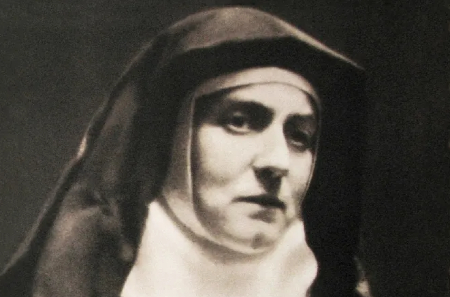We ask you, humbly: don't scroll away.
Hi readers, it seems you use Catholic Online a lot; that's great! It's a little awkward to ask, but we need your help. If you have already donated, we sincerely thank you. We're not salespeople, but we depend on donations averaging $14.76 and fewer than 1% of readers give. If you donate just $5.00, the price of your coffee, Catholic Online School could keep thriving. Thank you.Help Now >
WHAT IS GOING ON? Only 5 percent of terminal cancer patients fully understand their prognosis
FREE Catholic Classes
According to a new study on terminally-ill cancer patients, only five percent of patients fully understood their prognosis, which raises several questions.
We ask you, humbly: don't scroll away.
Hi readers, it seems you use Catholic Online a lot; that's great! It's a little awkward to ask, but we need your help. If you have already donated, we sincerely thank you. We're not salespeople, but we depend on donations averaging $14.76 and fewer than 1% of readers give. If you donate just $5.00, the price of your coffee, Catholic Online School could keep thriving. Thank you.Help Now >
Highlights
CALIFORNIA NETWORK (https://www.youtube.com/c/californianetwork)
5/24/2016 (7 years ago)
Published in Health
Keywords: Cancer, patients, health, disease, understand
LOS ANGELES, CA (Catholic Online) - Researchers from Memorial Sloan Kettering Cancer Center, Cornell University and Weill Cornell Medicine conducted a study on 178 terminally-ill cancer patients.
Each patient was interviewed and asked what stage cancer they had, their current health status, how long they thought they would live and whether they had a recent life-expectancy conversation with their doctors.
Of the 178 patients, only five percent were able to accurately answer the questions about their disease and estimated life expectancy.
Though the number of fully informed patients was low, twenty-three percent of the patients had both a recent a previous discussion with their doctors concerning their life-expectancy, yet somehow they were ill-informed of the other facts in their cases.
Co-author and Director of the Center for Research on End of Life Care at Weill Cornell Medical Center, Holly Prigerson, said the number of patients who didn't understand their prognoses was a "shock."
According to ZME Science, Prigerson claimed: "Many did not know that they were at the end-stage of their illness or that their cancer was incurable. They were basically making treatment decisions in the dark."
Prigerson told ABC News: "Our point is a lot of them don't want to know, but they need to know basic information about the disease and illness and treatment options."
Though doctors are honest with their patients, Prigerson believes they should be firm and give patients all of the information to allow the patient to make a better-informed decision.
"It's a difficult topic," Prigerson admitted. "Have patients understand, if that [sic] they are being offered treatment, it's not a cure. And they really have months not years to live."
Dr. Barbara Daly, the director of the clinical ethics program at University Hospitals Case Medical Center, described how patients struggle with the facts of their case:
"When you look at how people deal with information, some people deal with it by wanting more and more information. Some people deal with it and they see it as a threat in a sense so they don't hear it."
Dr. Daly explained how medical terms are often confusing for patients, and that doctors need to learn how to communicate with the public.
"It takes a high level of skill to talk to people," Daly stated, "to present it in a way where it's understandable. Doctors...they literally forget how to talk like a normal person."
The study, which was published in the Journal of Clinical Oncology, revealed patients who had end-of-life conversations with oncologists understood their condition better than those who didn't have the conversation, which Daly believes makes all the difference.
"If the patient him or herself is comfortable saying, 'Tell me how long you think I have to life?' or 'Tell me if you think the treatment is going to help?'" they will be better informed, Daly described.
Prigerson added: "That information may also help patients prioritize how they wish to spend the last few months of their lives, some by fulfilling 'bucket lists.' Treatment choices patients make might follow from these priorities."
Dr. Daly explained: "If we're going to help people, it's part of the whole movement to get people to plan for their healthcare...to make their wishes known."
The study did not focus on finding a solution to the ignorance of terminal cancer patients and was conducted on a limited number of participants. The findings should not be generalized for larger populations.
---
The California Network is the Next Wave in delivery of information and entertainment on pop culture, social trends, lifestyle, entertainment, news, politics and economics. We are hyper-focused on one audience, YOU, the connected generation. JOIN US AS WE REDEFINE AND REVOLUTIONIZE THE EVER-CHANGING MEDIA LANDSCAPE.
We ask you, humbly: don't scroll away.
Hi readers, it seems you use Catholic Online a lot; that's great! It's a little awkward to ask, but we need your help. If you have already donated, we sincerely thank you. We're not salespeople, but we depend on donations averaging $14.76 and fewer than 1% of readers give. If you donate just $5.00, the price of your coffee, Catholic Online School could keep thriving. Thank you.Help Now >
Join the Movement
When you sign up below, you don't just join an email list - you're joining an entire movement for Free world class Catholic education.
-

-
Mysteries of the Rosary
-
St. Faustina Kowalska
-
Litany of the Blessed Virgin Mary
-
Saint of the Day for Wednesday, Oct 4th, 2023
-
Popular Saints
-
St. Francis of Assisi
-
Bible
-
Female / Women Saints
-
7 Morning Prayers you need to get your day started with God
-
Litany of the Blessed Virgin Mary
New York Judge Halts Constitutional Amendment on Abortion Due to Procedural Flaws
-

Special Ways to Celebrate Mom This Mother's Day
-

Discalced Carmelites ask for Edith Stein to be declared 'Doctor of Truth'
-
Cinco de Mayo - What is the day really about?
-
Cinco de Mayo, the Fifth of May: A Day to Celebrate Heritage and History
Daily Catholic
 Daily Readings for Wednesday, May 08, 2024
Daily Readings for Wednesday, May 08, 2024 St. Peter of Tarantaise: Saint of the Day for Wednesday, May 08, 2024
St. Peter of Tarantaise: Saint of the Day for Wednesday, May 08, 2024 St. Augustine's Prayer to the Holy Spirit: Prayer of the Day for Wednesday, May 08, 2024
St. Augustine's Prayer to the Holy Spirit: Prayer of the Day for Wednesday, May 08, 2024- Daily Readings for Tuesday, May 07, 2024
- St. Rose Venerini: Saint of the Day for Tuesday, May 07, 2024
- Blessing of a New House: Prayer of the Day for Tuesday, May 07, 2024
![]()
Copyright 2024 Catholic Online. All materials contained on this site, whether written, audible or visual are the exclusive property of Catholic Online and are protected under U.S. and International copyright laws, © Copyright 2024 Catholic Online. Any unauthorized use, without prior written consent of Catholic Online is strictly forbidden and prohibited.
Catholic Online is a Project of Your Catholic Voice Foundation, a Not-for-Profit Corporation. Your Catholic Voice Foundation has been granted a recognition of tax exemption under Section 501(c)(3) of the Internal Revenue Code. Federal Tax Identification Number: 81-0596847. Your gift is tax-deductible as allowed by law.








 Daily Readings for Wednesday, May 08, 2024
Daily Readings for Wednesday, May 08, 2024 St. Peter of Tarantaise: Saint of the Day for Wednesday, May 08, 2024
St. Peter of Tarantaise: Saint of the Day for Wednesday, May 08, 2024 St. Augustine's Prayer to the Holy Spirit: Prayer of the Day for Wednesday, May 08, 2024
St. Augustine's Prayer to the Holy Spirit: Prayer of the Day for Wednesday, May 08, 2024

